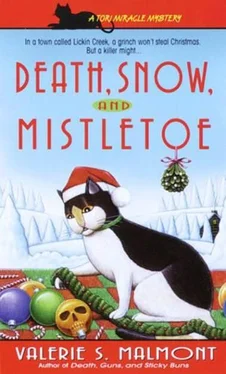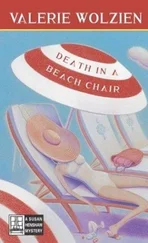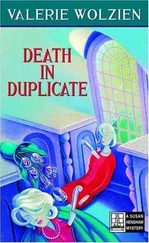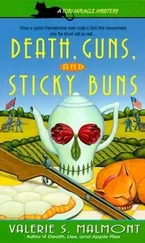“You could pour me some coffee,” he said. “I'm too tired to walk across the room.”
I poured out some thick black goop and was surprised it didn't dissolve the paper cup. Luscious drank it without complaint, while I washed the glass container and started a fresh pot brewing.
Satisfied I had prevented a future case of poisoning from rancid coffee oil, I sat on one of the two folding chairs reserved for guests.
Luscious said, “Coroner says those bones we found last night have been in the quarry for more than thirty years.”
He noticed my skeptical look. Caven County coroner was an elected position, and since Doc Jones's death it had been held by Henry Hoopengartner. Yes, the same Hoopengartner who owned this garage. Even though Henry had attended coroner school somewhere in the state, I still had doubts about Henry's ability to figure out anything and get it right.
Luscious guessed what I was thinking. “No special knowledge needed for this one, Tori. The divers found most of the bones under the wreck of a '59 Chevy-belonged to Chucky Fowler, what owns Fowler's Flowers now. He was pretty wild as a teenager, I hear. The car got rolled into the quarry back in '65 during a keg party. So Henry's pretty safe in guessing the skeleton was down there since before '65.”
“Could Henry determine the age and sex of the child?”
“Henry guesses about five years old at time of death. He said he couldn't tell the sex because little kids’ bones all look pretty much the same. He sent them to the medical examiner's office in Harrisburg.”
“Oretta came by my house this morning and told me it was a child named Eddie Douglas. Is that what you think?”
Luscious nodded and held up a manila folder. “I do. I've got his folder right here. He was the right age. And it's not like we've had dozens of kids go missing. There've been a few lost over the years-kids tend to wander-but Eddie was the only one that never turned up.”
“How long ago?”
Luscious wiggled his fingers in the air for a minute before coming up with an answer. “Thirty-seven years, last summer.”
“Have you contacted his parents?”
He shook his head and opened the folder. “According to what's in the file, his parents, Herman and Miriam Douglas, moved to Texas about a year after Eddie disappeared. I called Information, but there's no listing.”
“If you can't find them, who'll be responsible for burying him?” I asked. I hated the thought of the child being buried in the Lickin Creek equivalent of Potter's Field.
“No need to worry about that. Lickin Creek takes care of its own.”
I was waiting for the traffic light to change at the square when I realized I hadn't mentioned Bernice's letter to Luscious. However, since I didn't regard it as a real threat, I didn't think it was important to go back. Instead, I made a mental note to show it to him when next we met.
Cassie's rolltop desk was covered with folders and papers, piled high. I hung my ski jacket on the hook by the door and, as I turned, stubbed my toe on the box from the Home Shopping Network I'd asked Cassie to move yesterday.
“Sorry,” she said with a grimace. “Haven't had time to get to it. I've been collecting background information on Eddie Douglas's disappearance. It's all right here.”
I stifled a grin. Even Cassie had immediately known who the child was. Apparently, I was the only person in town who'd been out of the loop.
She gestured toward her desk. I was sure that even though it appeared to be an unorganized mess, Cassie knew exactly where everything was.
“You're an absolute wonder,” I told her. Her face flushed; the only sign that my remark pleased her.
I could tell by her appearance she now had her emotions under control. She wore an impeccably tailored tweed suit, in a color I would have described as heather during my short-lived career as a fashion reporter, her hair was pulled smoothly into a chignon, and a dramatic amber necklace accented the jewel neckline of her beige blouse.
I sat at my own rolltop desk and quickly wrote down my observations of last night's quarry search. “Can you fill this out with what you've found in the files?” I asked her.
“No problem.” Cassie smiled. She knew and I knew that this was part of the me-editor-you-assistant game we played. Cassie could easily do the whole edition without me.
“How was the council meeting?” she asked. “Let me guess, ‘Nothin’ says Christmas like colored lights,’ and ‘We'll deal with it the usual way, ya-dee-ya-dee-ya-da.’”
I grinned. “That was about it. Except Marvin Bum-baugh's daughter is saving Christmas by lending her baby doll for the manger scene.”
“I'll write it up with a straight face,” Cassie promised.
“Cassie, do you think it's possible that there could be a connection between Kevin's disappearance and the dead child?”
She appeared taken aback. “A connection? Why do you ask?”
I shook my head. “I really don't know. Praxythea suggested it. I don't suppose there was any mystery around Eddie's disappearance, was there?”
Cassie looked through her folder. “Not that I can tell from the clippings in here. Apparently, he went out to play alone and didn't come back.”
Like Kevin Poffenberger, I thought. No, not exactly, for Kevin hadn't been playing alone. His cousins had been with him. I needed to talk to them again.
“Okay, then,” I said, standing. “If you'll take care of writing the council report and the quarry discovery, I'll go up to the mountain and see how the search is going.”
Over the hills and everywhere

AS I DROVE TOWARD THE MOUNTAINS, I thought of how I'd seriously underestimated the work required to put out a weekly newspaper. I'd thought it would be a snap, leaving me with plenty of free time to finish up my second novel. Instead, I seemed to be working twenty-two-hour days and was never caught up with anything. I hadn't even looked at my half-finished manuscript in two months.
P. J. Mullins never worked that hard-I'd been told that often enough-and I was well aware of that fact. She'd earned new respect from me, and I couldn't wait until she was well enough to come back and take over again.
There were times, when I was snowed under at the Chronicle , I questioned my journalistic ability, and I had to remind myself that I'd often felt overwhelmed when I was working on the paper in New York. Although I'd won a couple of prizes for my investigative reporting, I'd never really felt comfortable with what I was doing there. What I need to do, I thought, is finish my novel and hope it's a best-seller. Then I'll never have to worry about working again. With pleasant thoughts of movie contracts and TV series drifting through my head, it seemed only a short time until I reached Corny's Corner.
The Iron Ore Road was still clogged with vehicles, but the parking situation at the crossroads was now better organized. A man in his youthful eighties, wearing a Day-Glo orange vest with black letters that said FIRE POLICE on the front, directed me to an empty place in the field. There were few media vehicles visible. I assumed they'd moved on to the latest tragedy du jour.
Walking was treacherous; the depth of the plowed furrows was hidden by the light dusting of snow. Wary of twisting an ankle, I slowly made my way to the area where the headquarters tent had been set up. I didn't recognize any of the women at the coffee and doughnut table, although one of them waved at me, which made me feel good.
Since Luscious was back in the borough, I wasn't sure whom I'd find inside the tent. The freckle-faced youngster in a Lickin Creek police uniform, studying a map, had to be the force's latest part-timer. One of a nonstop parade of recent graduates of the nearby junior college's criminal justice program. Once they had a little experience under their police belts, they moved on to “real” jobs elsewhere.
Читать дальше













